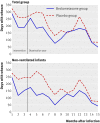The effect of high dose inhaled corticosteroids on wheeze in infants after respiratory syncytial virus infection: randomised double blind placebo controlled trial
- PMID: 19336497
- PMCID: PMC2663654
- DOI: 10.1136/bmj.b897
The effect of high dose inhaled corticosteroids on wheeze in infants after respiratory syncytial virus infection: randomised double blind placebo controlled trial
Abstract
Objective: To determine whether early initiated anti-inflammatory therapy with prolonged high dose inhaled glucocorticoids influences the occurrence and severity of recurrent wheeze after respiratory syncytial virus related lower respiratory tract infections.
Design: Randomised double blind placebo controlled trial.
Setting: Paediatric departments of 19 Dutch clinical centres.
Participants: 243 previously healthy infants (126 boys, 117 girls) aged less than 13 months and admitted to hospital with respiratory syncytial virus infection.
Interventions: 200 mug extra fine hydrofluoroalkane (HFA) beclometasone dipropionate twice daily or matched placebo administered by a pressurised metered dose inhaler and a spacer during the first three months after hospital admission.
Main outcome measure: The primary outcome was the number of days with wheeze in the year after the three month intervention period.
Results: Of the 243 eligible infants, 119 were randomised to receive beclometasone and 124 to receive placebo. No significant difference was found in the number of days with wheeze between the two groups (total days, 1761/33 568 in the beclometasone group v 2301/36 556 in the placebo group, P=0.31) and the proportion of infants with wheeze did not differ between the groups (61% in the beclometasone group v 62% in the placebo group, P=0.90). In the predefined subgroup of infants who did not need mechanical ventilation (n=221), beclometasone reduced the number of days with wheeze by 32% (relative reduction in total days, 1315/30 405 in the beclometasone group v 2120/33 149 in the placebo group, P=0.046). This reduction was most pronounced during the first six months of the follow-up year after intervention. The proportion of infants with wheeze did not differ between the groups (59% in the beclometasone group v 60% in the placebo group, P=0.89).
Conclusions: Early initiated high dose extra fine HFA beclometasone to infants during the first three months after hospital admission for respiratory syncytial virus infection has no major effect on recurrent wheeze. The general use of such treatment during lower respiratory tract infection with respiratory syncytial virus should not be advocated.
Trial registration: Current Controlled Trials ISRCTN12352714.
Conflict of interest statement
Competing interests: None declared.
Figures
References
-
- Perez-Yarza EG, Moreno A, Lazaro P, Mejias A, Ramilo O. The association between respiratory syncytial virus infection and the development of childhood asthma: a systematic review of the literature. Pediatr Infect Dis J 2007;26:733-9. - PubMed
-
- Stein RT, Sherrill D, Morgan WJ, Holberg CJ, Halonen M, Taussig LM, et al. Respiratory syncytial virus in early life and risk of wheeze and allergy by age 13 years. Lancet 1999;354:541-5. - PubMed
-
- Kuehni CE, Davis A, Brooke AM, Silverman M. Are all wheezing disorders in very young (preschool) children increasing in prevalence? Lancet 2001;357:1821-5. - PubMed
-
- Bont L, Steijn M, van Aalderen WM, Kimpen JL. Impact of wheezing after respiratory syncytial virus infection on health-related quality of life. Pediatr Infect Dis J 2004;23:414-7. - PubMed
Publication types
MeSH terms
Substances
Associated data
LinkOut - more resources
Full Text Sources
Medical


